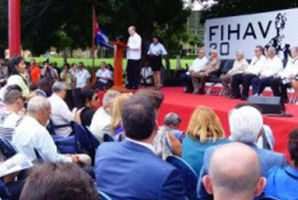GUANTÁNAMO, Cuba, November, www.cubanet.org – Alain Lobaina Laseria is a mathematics graduate and worked in the Pedro Agustín Pérez Basic Secondary School in the municipality of El Salvador in Guantánamo. However, he has been dismissed from his employment for reporting failures and irregularities related to the education system.
When one teacher at the school went to complete a work mission to Haiti and another transferred to a polytechnic, Alain, who until that point had worked as a tutor, had to teach mathematics and physics to eighth grade students. Upon receiving the groups he carried out an examination to check the students’ knowledge and the results were disastrous. In one of the groups no one passed and in the other, from 72 students, only 7 passed.
As the course advanced Alain noticed that the students level of knowledge was extremely low. After carrying out the second test in mathematics, he failed 8 students because they had handed in their exam papers almost completely blank. After reporting the results, the teacher in charge of the grade carried out an analysis and threatened him, saying that he could not fail those students. From that moment onwards his situation in the school became very difficult.
Then he decided to write, under the protection of Article 63 of the Constitution of the Republic, a letter to the government and the municipal Party in which he reported the fraud that had been committed in the school and how he had been pressured to pass 100 percent of the students.
Furthermore, as a response to the public call to the highest levels of government and the Party to combat corruption and all kinds of violations, Alain reported other cases of fraud committed in Polytechnic No. 2, in the San Justo neighbourhood, in the Vocational Computing Polytechnic, in the Pre-University Vocational Institute of Exact Sciences and in the educational centres of the city of Guantanamo.
Shortly after Alain sent his letter, the Provincial Director of Education turned up at the school and read it in front of all the workers. The purpose of discrediting him in front of his colleagues and making an enemy of him was made clear through the following warnings: “All of this school’s workers can be involved in this….this letter cannot be published in the Venceremos de Guatanamo Newspaper…and we will not tolerate a Gorbachov here in El Salvador”
In the final test, Alain failed various students, being the only teacher who didn’t promote 100 percent of students. In the re-evaluation test he caught a student copying the exam responses from a cheat sheet and reported the incident to the school administration. However, all he achieved was to have the school principal, Angel Velazquez, the secretary of the Party named Leticia, the municipal education teacher leader and the secretaries of the UJC (Young Communist Union) and the trade union reprimand him as if he were the guilty one.
Although Alain was opposed to the fraudulent student sitting another re-evaluation test, the aforementioned people agreed to allow it and they never investigated to find out how, suspiciously, the boy obtained the correct responses to the exam.
Upon starting this school semester, the principal of the school cancelled Alain’s work contract. All this has occurred after the Granma Newspaper has repeatedly denounced academic fraud and the radio program “Speaking Clearly” of Rebel Radio and the television program “The Roundtable” have adopted similar positions.
Roberto Jesús Quiñones Haces
Cubanet, 19 November 2013
Translated by Peter W Davies




